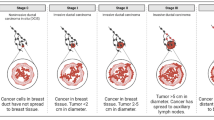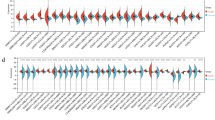Abstract
Purpose
The presence of circulating tumor cells (CTCs) has been found to correlate with colorectal cancer (CRC) prognosis, whereas epithelial-mesenchymal transition (EMT) in CTCs has been found to be associated with CRC metastasis. LGR5 is a known target of Wnt signaling and plays an important role in CRC development. The aim of this study was to assess the clinical relevance of EMT and LGR5 expression in CTCs from CRC patients.
Methods
Sixty-six CRC patients were included in this study. The detection and expression of EMT phenotypes in CTCs from these patients were assessed using CanPatrol™ CTC enrichment and mRNA in situ hybridization (ISH), respectively. LGR5 expression in the CTCs was assessed using mRNA ISH.
Results
CTCs were detected in 86.4% (57/66) of the CRC patients included. Both the numbers of total CTCs and of CTCs displaying a mesenchymal phenotype (M+ CTCs) were found to significantly correlate with advanced disease stages and the occurrence of metastasis (p < 0.05). An adjusted multivariate analysis also indicated that the number of M+ CTCs significantly correlated with the occurrence of metastasis (p = 0.031). Additionally, we found that a high LGR5 expression level significantly correlated with the occurrence of metastasis (p < 0.05). We also found that the presence of ≥ 6 CTCs or ≥ 3 M+ CTCs per 5 ml blood significantly correlated with disease progression (p < 0.05). Patients with ≥ 6 CTCs or ≥ 3 M+ CTCs per 5 ml blood were found to exhibit poorer progression-free survival (PFS) and overall survival (OS) rates (p < 0.05 in all cases). Using Cox regression analyses, we found that only total CTC numbers remained as independent prognostic factors for a worse PFS (p = 0.043).
Conclusions
From our data we conclude that CTC numbers and EMT phenotypes may serve as prognostic markers for disease progression and metastasis in CRC patients. In addition, we conclude that LGR5 expression in CTCs may serve as a marker for CRC metastasis.



Similar content being viewed by others
References
F. Grizzi, G. Celesti, G. Basso, L. Laghi, Tumor budding as a potential histopathological biomarker in colorectal cancer: hype or hope? World J Gastroenterol 18, 6532–6536 (2012)
H. Brenner, M. Kloor, C.P. Pox, Colorectal cancer. Lancet 383, 1490–1502 (2014)
I. Zlobec, Novel biomarkers for the prediction of metastasis in colorectal cancer. Expert Opin Med Diagn 7, 137–146 (2013)
F. Andre, E. Mardis, M. Salm, J.C. Soria, L.L. Siu, C. Swanton, Prioritizing targets for precision cancer medicine. Ann Oncol 25, 2295–2303 (2014)
K. Pantel, R.H. Brakenhoff, Dissecting the metastatic cascade. Nat Rev Cancer 4, 448–456 (2004)
R. Paduch, The role of lymphangiogenesis and angiogenesis in tumor metastasis. Cell Oncol 39, 397–410 (2016)
H. Imamura, Y. Matsuyama, E. Tanaka, T. Ohkubo, K. Hasegawa, S. Miyagawa, Y. Sugawara, M. Minagawa, T. Takayama, S. Kawasaki, M. Makuuchi, Risk factors contributing to early and late phase intrahepatic recurrence of hepatocellular carcinoma after hepatectomy. J Hepatol 38, 200–207 (2003)
N. Bednarz-Knoll, C. Alix-Panabieres, K. Pantel, Clinical relevance and biology of circulating tumor cells. Breast Cancer Res 13, 228 (2011)
R. Kalluri, R.A. Weinberg, The basics of epithelial-mesenchymal transition. J Clin Invest 119, 1420–1428 (2009)
R. Kalluri, EMT: When epithelial cells decide to become mesenchymal-like cells. J Clin Invest 119, 1417–1419 (2009)
J. Sastre, M.L. Maestro, J. Puente, S. Veganzone, R. Alfonso, S. Rafael, J.A. García-Saenz, M. Vidaurreta, M. Martín, M. Arroyo, M.T. Sanz-Casla, E. Díaz-Rubio, Circulating tumor cells in colorectal cancer: correlation with clinical and pathological variables. Ann Oncol 19, 935–938 (2008)
P. Gazzaniga, W. Gianni, C. Raimondi, A. Gradilone, G. Lo Russo, F. Longo, O. Gandini, S. Tomao, L. Frati, Circulating tumor cells in high-risk nonmetastatic colorectal cancer. Tumor Biol 34, 2507–2509 (2013)
N.N. Rahbari, M. Aigner, K. Thorlund, N. Mollberg, E. Motschall, K. Jensen, M.K. Diener, M.W. Büchler, M. Koch, J. Weitz, Meta-analysis shows that detection of circulating tumor cells indicates poor prognosis in patients with colorectal cancer. Gastroenterology 138, 1714–1726 (2010)
M. Thorsteinsson, P. Jess, The clinical significance of circulating tumor cells in non-metastatic colorectal cancer–a review. EJSO-Eur J Surg Onc 37, 459–465 (2011)
S. Maheswaran, L.V. Sequist, S. Nagrath, L. Ulkus, B. Brannigan, C.V. Collura, E. Inserra, S. Diederichs, A.J. Iafrate, D.W. Bell, S. Digumarthy, A. Muzikansky, D. Irimia, J. Settleman, R.G. Tompkins, T.J. Lynch, M. Toner, D.A. Haber, Detection of mutations in EGFR in circulating lung-cancer cells. N Engl J Med 359, 366–377 (2008)
E. Pailler, J. Adam, A. Barthélémy, M. Oulhen, N. Auger, A. Valent, I. Borget, D. Planchard, M. Taylor, F. André, J.C. Soria, P. Vielh, B. Besse, F. Farace, Detection of circulating tumor cells harboring a unique ALK rearrangement in ALK-positive non-small-cell lung cancer. J Clin Oncol 31, 2273–2281 (2013)
N. Barker, H. Clevers, Leucine-rich repeat-containing G-protein-coupled receptors as markers of adult stem cells. Gastroenterology 138, 1681–1696 (2010)
A. Merlos-Suarez, F.M. Barriga, P. Jung, M. Iglesias, M.V. Céspedes, D. Rossell, M. Sevillano, X. Hernando-Momblona, V. da Silva-Diz, P. Muñoz, H. Clevers, E. Sancho, R. Mangues, E. Batlle, The intestinal stem cell signature identifies colorectal cancer stem cells and predicts disease relapse. Cell Stem Cell 8, 511–524 (2011)
Y. Yamamoto, M. Sakamoto, G. Fujii, H. Tsuiji, K. Kenetaka, M. Asaka, S. Hirohashi, Overexpression of orphan G-protein-coupled receptor, Gpr49, in human hepatocellular carcinomas with β-catenin mutations. Hepatology 37, 528–533 (2003)
T. McClanahan, S. Koseoglu, K. Smith, J. Grein, E. Gustafson, S. Black, P. Kirschmeier, A.A. Samatar, Identification of overexpression of orphan G protein-coupled receptor GPR49 in human colon and ovarian primary tumors. Cancer Biol Ther 5, 419–426 (2006)
K. Tanese, M. Fukuma, T. Yamada, T. Mori, T. Yoshikawa, W. Watanabe, A. Ishiko, M. Amagai, T. Nishikawa, M. Sakamoto, G-protein-coupled receptor GPR49 is up-regulated in basal cell carcinoma and promotes cell proliferation and tumor formation. Am J Pathol 173, 835–843 (2008)
H. Uchida, K. Yamazaki, M. Fukuma, T. Yamada, T. Hayashida, H. Hasegawa, M. Kitajima, Y. Kitagawa, M. Sakamoto, Overexpression of leucine-rich repeat-containing G protein-coupled receptor 5 in colorectal cancer. Cancer Sci 101, 1731–1737 (2010)
E. Simon, D. Petke, C. Böger, H. Behrens, V. Warneke, M. Ebert, C. Röcken, The spatial distribution of LGR5+ cells correlates with gastric cancer progression. PLoS One 7, e35486 (2012)
A.G. Schepers, H.J. Snippert, D.E. Stange, M. van den Born, J.H. van Es, M. van de Wetering, H. Clevers, Lineage tracing reveals Lgr5+ stem cell activity in mouse intestinal adenomas. Science 337, 730–735 (2012)
S. Yui, T. Nakamura, T. Sato, Y. Nemoto, T. Mizutani, X. Zheng, S. Ichinose, T. Nagaishi, R. Okamoto, K. Tsuchiya, H. Clevers, M. Watanabe, Functional engraftment of colon epithelium expanded in vitro from a single adult Lgr5+ stem cell. Nat Med 18, 618–623 (2012)
H.C. Hsu, Y.S. Liu, K.C. Tseng, B.C. Tan, S.J. Chen, H.C. Chen, LGR5 regulates survival through mitochondria-mediated apoptosis and by targeting the Wnt/β-catenin signaling pathway in colorectal cancer cells. Cell Signal 26, 2333–2342 (2014)
S. He, H. Zhou, X. Zhu, S. Hu, M. Fei, D. Wan, W. Gu, X. Yang, D. Shi, J. Zhou, J. Zhou, Z. Zhu, L. Wang, D. Li, Y. Zhang, Expression of Lgr5, a marker of intestinal stem cells, in colorectal cancer and its clinicopathological significance. Biomed Pharmacother 68, 507–513 (2014)
X.S. Wu, H.Q. Xi, L. Chen, Lgr5 is a potential marker of colorectal carcinoma stem cells that correlates with patient survival. World J Surg Onc 10, 244 (2012)
H.C. Hsu, Y.S. Liu, K.C. Tseng, C.L. Hsu, Y. Liang, T.S. Yang, J.S. Chen, R.P. Tang, S.J. Chen, H.C. Chen, Overexpression of Lgr5 correlates with resistance to 5-FU-based chemotherapy in colorectal cancer. Int J Color Dis 28, 1535–1546 (2013)
Z. Liu, W. Dai, L. Jiang, Y. Cheng, Over-expression of LGR5 correlates with poor survival of colon cancer in mice as well as in patients. Neoplasma 61, 177–185 (2014)
S. Wu, S. Liu, Z. Liu, J. Huang, X. Pu, J. Li, D. Yang, H. Deng, N. Yang, J. Xu, Classification of circulating tumor cells by epithelial-mesenchymal transition markers. PLoS One 10, e0123976 (2015)
R. Zhao, Z. Cai, S. Li, Y. Cheng, H. Gao, F. Liu, S. Wu, S. Liu, Y. Dong, L. Zheng, W. Zhang, X. Wu, X. Yao, Expression and clinical relevance of epithelial and mesenchymal markers in circulating tumor cells from colorectal cancer. Oncotarget 8, 9293–9302 (2017)
L. Wan, K. Pantel, Y. Kang, Tumor metastasis: moving new biological insights into the clinic. Nat Med 19, 1450–1464 (2013)
A. Chavez-Gonzalez, B. Bakhshinejad, K. Pakravan, M.L. Guzman, S. Babashah, Novel strategies for targeting leukemia stem cells: sounding the death knell for blood cancer. Cell Oncol 40, 1–20 (2017)
F.H. Shek, R. Luo, B.Y.H. Lam, W.K. Sung, T.W. Lam, J.M. Luk, M.S. Leung, K.T. Chan, H.K. Wang, C.M. Chan, R.T. Poon, N.P. Lee, Serine peptidase inhibitor Kazal type 1 (SPINK1) as novel downstream effector of the cadherin-17/β-catenin axis in hepatocellular carcinoma. Cell Oncol 40, 443–456 (2017)
T. Masuda, N. Hayashi, T. Iguchi, S. Ito, H. Eguchi, K. Mimori, Clinical and biological significance of circulating tumor cells in cancer. Mol Oncol 10, 408–417 (2016)
A. Brouwer, B. De Laere, D. Peeters, M. Peeters, R. Salgado, L. Dirix, S. Van Laere, Evaluation and consequences of heterogeneity in the circulating tumor cell compartment. Oncotarget 7, 48625–48643 (2016)
L.M. McInnes, N. Jacobson, A. Redfern, A. Dowling, E.W. Thompson, C.M. Saunders, Clinical implications of circulating tumor cells of breast cancer patients: role of epithelial-mesenchymal plasticity. Front Oncol 5, 42 (2015)
B.G. Koerkamp, N.N. Rahbari, M.W. Büchler, M. Koch, J. Weitz, Circulating tumor cells and prognosis of patients with resectable colorectal liver metastases or widespread metastatic colorectal cancer: a meta-analysis. Ann Surg Oncol 20, 2156–2165 (2013)
L.T. Seeberg, A. Waage, C. Brunborg, H. Hugenschmidt, A. Renolen, I. Stav, B.A. Bjørnbeth, K.W. Brudvik, E.F. Borgen, B. Naume, G. Wiedswang, Circulating tumor cells in patients with colorectal liver metastasis predict impaired survival. Ann Surg 261, 164–171 (2015)
Acknowledgments
The authors sincerely thank all the investigators and coordinators who contributed to this study.
Funding
This study was supported by Guangzhou collaborative innovation major projects for “development and industrialization of key technology and product for tumor precision medical real time monitoring” (number 201604010039) and by Guangzhou health care collaborative innovation major projects for “development and industrialization of the clinical application of circulating tumor cell separation, typing and analysis of automatic equipment and reagents” (number 201604020014).
Author information
Authors and Affiliations
Corresponding author
Ethics declarations
Conflict of interest
The authors declare that there are no conflicts of interest.
Ethical approval
All procedures performed in the studies involving human participants were in accordance with the ethical standards of the institutional and/or national research committee and with the 1964 Helsinki declaration and its later amendments or comparable ethical standards. This study was approved by the Ethics Committee of the First Affiliated Hospital of Chongqing Medical University.
Informed consent
Informed consent was obtained from all the patients included in the study.
Rights and permissions
About this article
Cite this article
Wang, W., Wan, L., Wu, S. et al. Mesenchymal marker and LGR5 expression levels in circulating tumor cells correlate with colorectal cancer prognosis. Cell Oncol. 41, 495–504 (2018). https://doi.org/10.1007/s13402-018-0386-4
Accepted:
Published:
Issue Date:
DOI: https://doi.org/10.1007/s13402-018-0386-4




